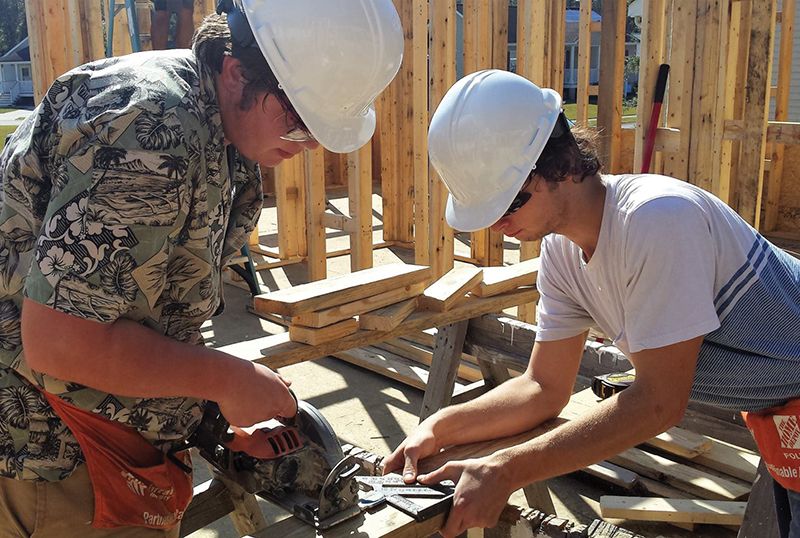The nonprofit is building a home downtown for a mother and her three-year-old son

Applicants work alongside Habitat volunteers and staff to help build their own houses.
Alex Seaman’s apartment didn’t have room for the wheelchair required by her three-year-old son, Forrest, who was born with only a right arm and no other limbs. She couldn’t afford a home downtown close to the medical facilities where he has frequent appointments. So Seaman applied to Habitat for Humanity, which offers families that make 35 to 60 percent of the area median income the opportunity to own a home.
“It’s going to change our life,” says Seaman. “He’s so independent-minded and loves to do everything himself, but he still needs assistance with everything, even playing. The house will be built around his needs.”
It’s the first home Habitat is building on the peninsula in almost 10 years because of the cost. “It was a real challenge for us, and we were so fortunate [the city] donated the lot to us and was instrumental in helping us get plans and permitting and going through all the layers you have to when you are building in the historic district,” says Lynn Bowley, executive director of Charleston Habitat for Humanity.
Bowley emphasizes that Habitat offers “a hand up, not a handout.” Those filling out the twice-yearly application must prove their situational and economic need, as well as demonstrate an ability to repay the reduced mortgage of an average $95,000, including repayment of permit fees and supplies, but not labor. While rent for a typical one-bedroom in Charleston costs $1,600 a month, the Habitat mortgages average $500 per month, which is for principal and escrow of payments for insurance, taxes, and a termite bond. The mortgages are zero interest, and the homeowner builds equity with each payment.

(Left) Three-year-old Forrest with his mom, Alex; (Right) Sales from Habitat’s ReStore retail space, which was recently renovated to ensure social distancing and easier sterilization, help fund its construction projects.
Perhaps most important, applicants must be willing to put 400 hours of “sweat equity” into the 18-month process such as working in Habitat’s retail store and building houses, including their own. They work on jobs such as installing and caulking windows alongside volunteers who are supervised by Habitat staff builders. They also are required to attend classes about finances and home ownership. “There’s a big learning curve from being a lifetime renter to a first-time home buyer, especially if there’s not a history of home ownership in your family,” Bowley says.
In addition to building two to four Charleston and North Charleston homes a year, Habitat is expanding its critical rehabilitation and repair services, to about 10 homes a year. Repairs can be extensive, averaging $10,000 to $15,000, often because of deferred basic maintenance by owners who can’t afford upkeep. Habitat asks for a repayment of about 10 percent of the cost, depending on household income.
The nonprofit relies on donations, partnerships, and volunteers for funding, as well as sales from its ReStore retail space on Meeting Street. Of course, COVID has led to changes, from remodeling the store to ensure easier sterilization to limiting volunteers. “We’ve had to shrink down our construction volunteering to a limit of 10 people per site and probably smaller as we move inside the home because [of] social distancing,” Bowley says. “It lengthens the time of the build, no question about it, when you have half as many volunteers. Plus, the pandemic has increased the cost of materials, some by three times. All that has to be offset with fundraising or donations. We can’t tell someone their home is going to cost three times as much now.”
The cost of that dream may be rising, but Bowley says it’s worth it. Habitat for Humanity International did a survey of Habitat homeowners across the country, and 74 percent said their health had improved. “It’s like a stone dropped into a pond,” she said. “If the children are healthier, they don’t miss as much school, and they are more likely to graduate and get better jobs. If the children are healthier, the parents aren’t missing as much time from work, they get better job evaluations and better advancement. This rewards people for their hard work and allows them to soar. That is what we are trying to do, give them that hand up that takes the shackles of lower income off of them and allows them to achieve that potential.”
Watch this Instagram video from Charleston's Habitat for Humanity